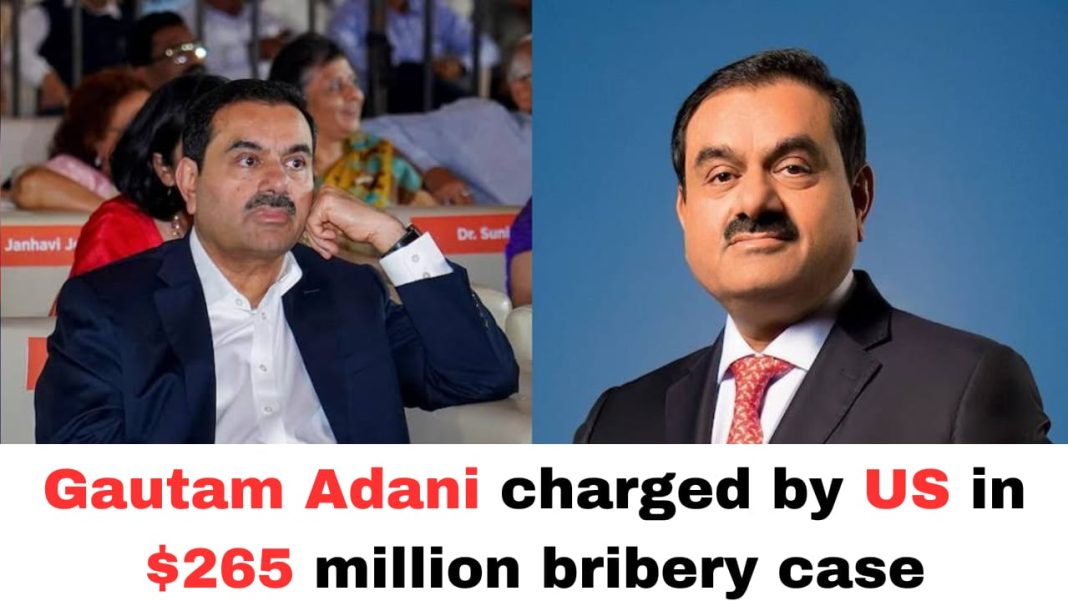Digital News Guru:
The Adani Group Indictment
In a dramatic development, Gautam Adani, one of the world’s richest individuals and chairman of the Adani Group, alongside seven associates, has been indicted by the U.S. Department of Justice. The charges allege a $265 million bribery scheme, accusing Adani’s conglomerate of paying significant sums to Indian officials in exchange for favorable treatment in securing renewable energy and infrastructure contracts. This scandal, involving one of India’s most influential business magnates, has shaken global markets and raised questions about corporate governance.
Key Allegations and the U.S. Case
The indictment accuses the Adani Group of violating international anti-corruption laws by offering bribes to Indian government officials to secure contracts across multiple sectors. The $265 million allegedly paid out was aimed at influencing tenders and agreements in the burgeoning renewable energy market. U.S. prosecutors described the scheme as a sophisticated network of offshore shell companies, fraudulent invoicing, and opaque financial transactions.

The charges highlight systemic issues in the way influential corporations may influence decision-making processes in emerging economies. While these allegations remain under judicial review, the potential consequences for Adani Group’s global reputation and operations are profound.
Kenyan Fallout and International Ramifications
One immediate international repercussion of the indictment came from Kenya. President William Ruto canceled two major contracts with the Adani Group: a $736 million public-private partnership for energy transmission lines and a long-term airport management agreement.
This move by Kenya reflects broader concerns about the integrity of cross-border investments involving large corporations. By distancing itself from Adani, Kenya aims to protect its governance reputation and avoid being implicated in international scandals.
Economic Implications
The indictment’s impact on the Adani Group’s financial health has been stark. Shares of Adani’s companies plummeted by nearly 20% in the immediate aftermath of the announcement, wiping out more than $27 billion in market capitalization. The group also withdrew a planned $600 million U.S. bond sale, highlighting the financial uncertainty brought on by the scandal. This loss is particularly significant given the Adani Group’s role as a key player in India’s renewable energy transition and infrastructure expansion.

Investors globally have reacted with caution. Analysts suggest that the group’s credibility, already under scrutiny following the 2023 Hindenburg Research report alleging fraud and stock manipulation, has been further eroded. The fallout from this indictment may hinder the group’s ability to raise funds internationally, a critical factor for its expansion plans.
India’s Domestic Response
The indictment has sparked a political firestorm in India. Opposition parties have seized the moment to criticize the central government, accusing it of undue favoritism toward the Adani Group. The Congress party, a key opposition force, has called for a thorough domestic investigation into Adani’s business practices and its alleged proximity to high-ranking officials.
Meanwhile, the Adani Group has categorically denied all allegations. The company stated that it would explore “all possible legal recourse” to defend its reputation. This reaction reflects Adani’s determination to counter the narrative while navigating what may be its most significant crisis.
The Bigger Picture: Corporate Governance in India
The Adani indictment has reignited discussions about corporate governance and accountability in India. As one of the country’s largest conglomerates, Adani’s operations span critical sectors, including energy, ports, and infrastructure. Any disruption to its business could have far-reaching consequences for India’s economy, particularly its ambitious goals in renewable energy and infrastructure development.
Critics argue that the scandal reveals deeper systemic issues, including inadequate regulatory oversight and the potential for conflicts of interest between powerful corporations and government bodies. This incident may prompt reforms aimed at increasing transparency and reducing corporate influence over public policy.
Global Implications
Beyond India, the Adani scandal serves as a cautionary tale for multinational corporations operating in emerging markets. It highlights the risks of prioritizing rapid growth over compliance with anti-corruption norms. For investors, the incident underscores the importance of due diligence and the potential liabilities associated with governance failures.
The indictment also reflects the growing willingness of U.S. authorities to intervene in cases of international corruption, particularly when they involve American financial systems. This trend may lead to heightened scrutiny of large corporations with global operations, especially those in sectors like energy and infrastructure.

Adani’s Path Forward
For the Adani Group, the road ahead will be challenging. Rebuilding trust with investors, governments, and the public will require significant efforts. Legal battles in the U.S. and potentially other jurisdictions could consume resources and time, diverting attention from the group’s core business operations.
To recover from this crisis, the Adani Group may need to implement comprehensive governance reforms, increase transparency, and collaborate with regulators to restore its credibility. Whether these measures will be sufficient to repair the damage remains uncertain.
Conclusion
The Adani Group indictment is not just a corporate scandal but a moment of reckoning for global businesses. It raises critical questions about the ethical responsibilities of corporations, the role of governments in ensuring accountability, and the mechanisms needed to combat corruption in the international economic system.
For India, the scandal represents a dual challenge: protecting its economic ambitions while addressing perceptions of crony capitalism. The outcome of this case will likely shape discussions on corporate ethics and governance for years to come, making it a pivotal moment in the global fight against corruption.
You May Also Read: A.R. Rahman and Saira Banu: A Separation After 29 Years of Marriage








